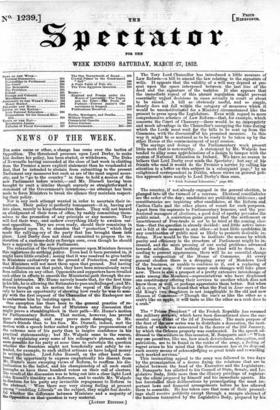NEWS OF THE WEEK.
Ton some cause or other, a change has come over the tactics of Opposition. The threatened pressure upon Lord Derby, to make him declare his policy, has been abated, or withdrawn. The Duke of Newcastle having succeeded at the close of last week in eliciting from the Premier a more explicit statement than he vouchsafed at first, that he intended to-abstain from submitting to the present Parliament any measures but such as are bf the most urgent neces- sity,:and to " go to the country" in time to hold a session of the new Parliament before winter,—and Mr. Disraeli having been brought te emit a similar though scarcely so straightforward a statement :of the Government's intentions,—no attempt has been made to force Ministers to break the silence they maintain respect- ing their policy. Nor is any such attempt wanted in 'order to ascertain their in- tentions. Their policy is perfectly transparent—it is, having got into place, merely to keep themselves there. They will not hazard an abridgment of their term of office, by rashly committing them- selves to the promotion of any principle or any measure. They will feel their way, and eschew everything likely to awaken ear- nest opposition._ They are even ready, should their remaining in office depend upon it, to abandon that " protection " which they made the rallying-cry of the party that has brought them into place. LOrd Derby does not star d committed to propose the re- storation of a customs-duty on foreign cern, even though he should have a majority in the new Parliament. : The relaxation of the Opposition pressure upon Ministers favours this inglorious do-nothing policy. Even had it been persisted in it might have little availed ; seeing that it was resolved to give battle to Ministers exclusively on the ground of Protection, and seeing that Ministers will not meet them upon that ground. But having evaded discussion on that point, they have been miraculously saved from collision on any other. Opponents and supporters have rivalled each other in efforts to smooth the Ministerial path through the ses- sional intricacies. Mr. Hume naively boasts that, for the first time in his life, he is allowing the Estimates to pass unchallenged ; and Mr. Prewen brought on his motion for the repeal of the Hop-duty only to have an opportunity of showing how ready he was to aom- ply with the first request of the Chancellor of the Exchequer not to embarrass him by insisting upon it. One exception has there been to the general practice of re- moving from before the feet of Ministers any discussion that might prove a stumblingblock in their path—Mr. Hume's motion for Parliamentary Reform. That motion, however, has proved more embarrassing, and may prove more damaging, to Mr. Home's friends than to his foes. Mr. Disraeli, indeed, met the motion with a speech better suited to gratify the prepossessions of the extreme men of his party than to inspire confidence in his practical statesmanship ; but Mr. Walpole came to the rescue, and, by explaining away some of his colleague's phrases, made it seem possible for his party at some time to entertain the question whether -the franchise might not beneficially and safely be ex,
tended, for example, to such skilled artisans as have 1 d money in savings-banks. Lord John Russell, on the other hand, em- braced the opportunity to express emphatically his- dissent from lir. 'fume's more sweeping views of Reform, to reaffirm his dis- inclination to the ballot, and his championship of all such small boroughs as have three hundred voters on their roll of electors. The result of the discussion was to bring out into a clear light Lord John Russell's timidity as a Reformer, and to enable Mr. Walpole to disclaim for his party any invincible repugnance to Reform in the abstract. Were there any very strong feeling at present among "confiding Liberals" on the subject, they might feel doubt- ful whether the difference between Ministers and a majority of the Opposition on that question is very material. The Tory Lord Chancellor has introduced a little measure of
Law Reform—a amend the law relating to the signature of wills. - It appears that the validity of a !nil may depend at pre= sent upon the space interpoied between the last line of the deed and the signature of the testator. It also appears that the immediate repeal of this absurd regulation might prevent essentially unjust decisions in, cases actually in court or about to be raised. .A bill so -.obviously useful, and so simple, clearly does not fall within the category. of measures which it would be unconstitutiodal for a Miaistrycironinstanced like the present to press upoythe Legidlifure; Even with .regard. to more comprehensive schemes otl,aw. Reform-,that, for exaniple, which concerns the Court of Chancery—there would-be no.-imyrppdety and much advantage in the Chancellor'S occupying the time shiring which the Lords' must Wait fri. •the bills- to be sent uptrom the Commons, with the discinidioffrof his promised , In 'this way it might be so matured-is te,be 'ready to -betaken up by the ether House at the commencement of neat session.
The sayings and 'doings Of the'-Parliamentary week present little more that is noteworthy: A 'statement by. Mr'. Walpole has tended to allay some tipiilehensiOni of a design to tamper with the system of National Education in Ireland.; We have ne maim "tp believe that Lord Derby ever reads the, SiectiztOr but-an y of his friends who readit would do the' Preniier a service 14.calling,lna attention to a letter oh-thisaithjeetia inbaktienf page,' by ay. enlightened correspondent in Dublin, whose views on general poli- tics approach more nearly 't4 Lord Derbfe thin ours. • " Irish National Educatio-n," piige 295.


























